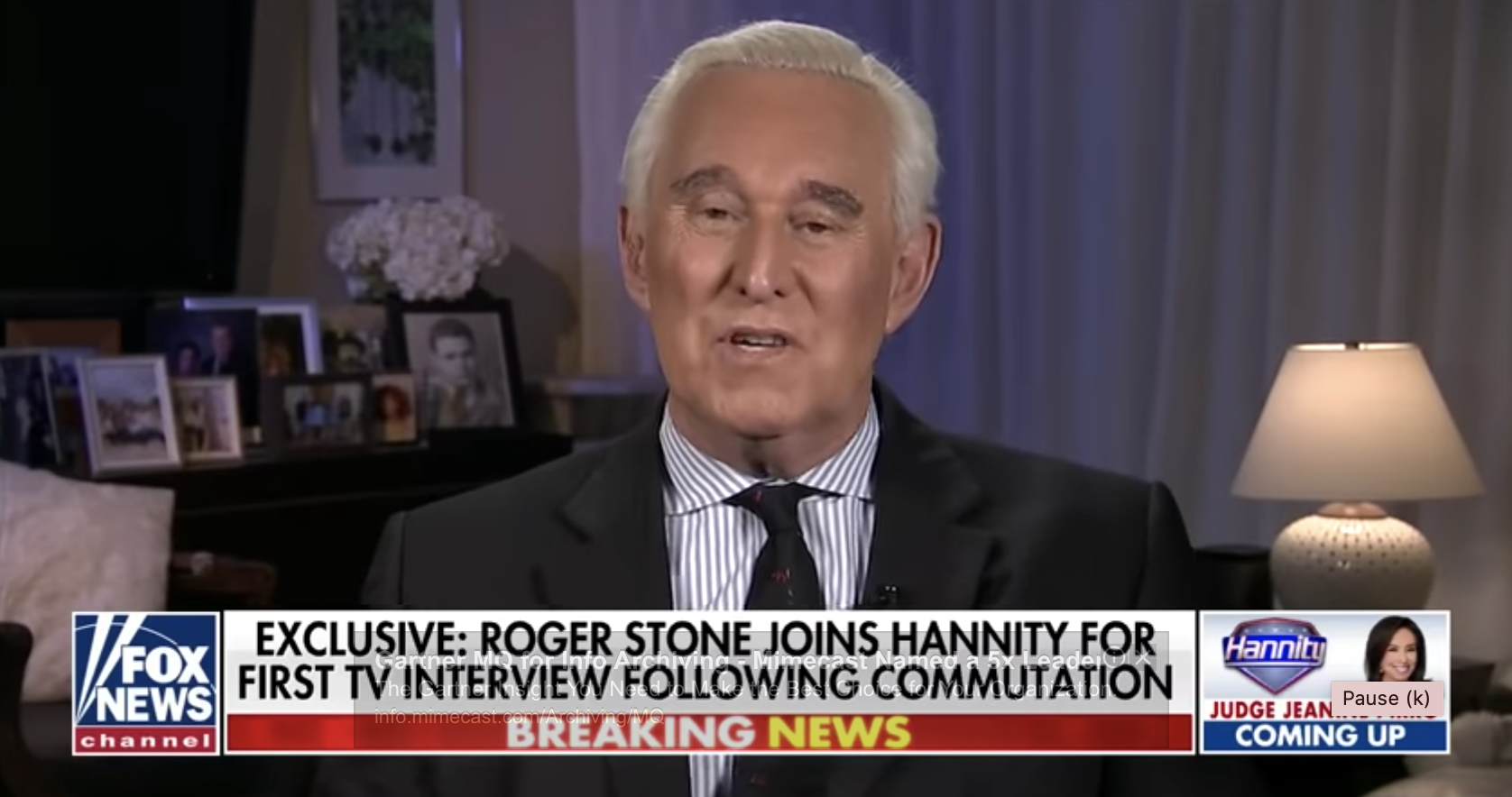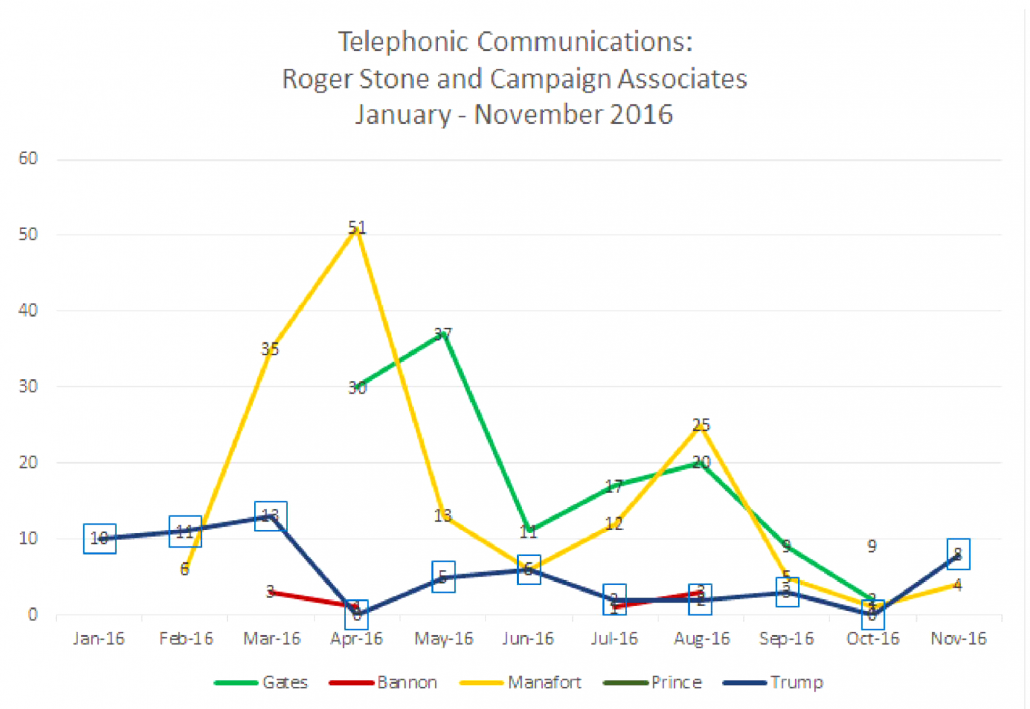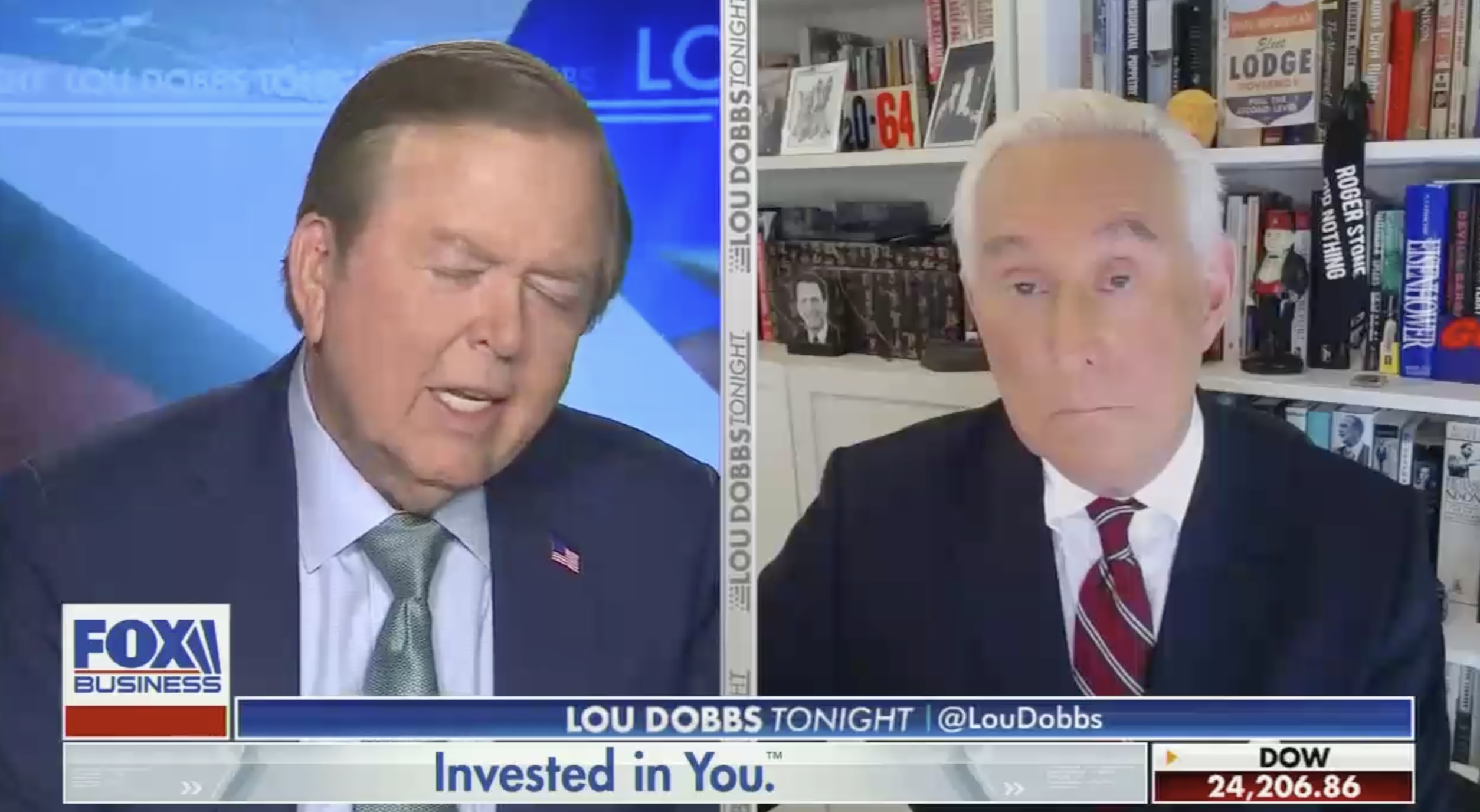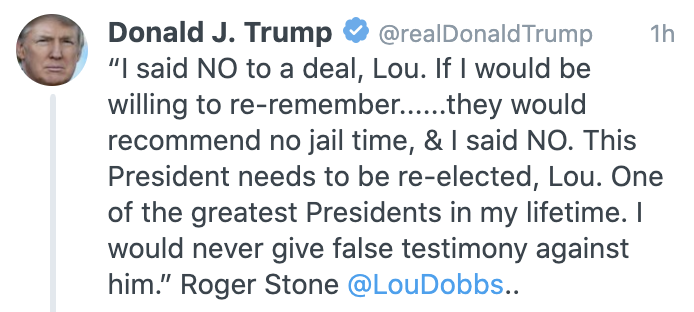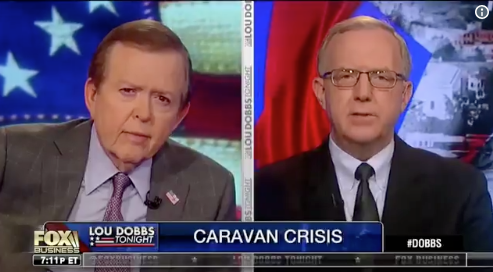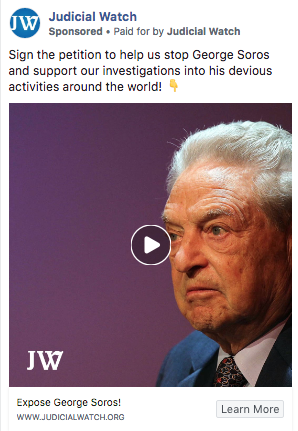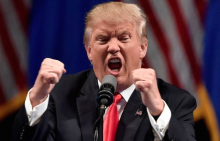In his abundant free time, the President tweeted about pardoning Mike Flynn on Sunday.

According to Matt Gertz, this was a response to a Lou Dobbs segment with John Solomon where Dobbs said there are 302s that “can’t be found.” Per transcripts Gertz shared, this is a reference to Sidney Powell’s claim — repeated with Dobbs the day before — that the first draft of Flynn’s 302 is missing (she also complained that Flynn never received a January 2017 memo stating that DOJ did not believe Flynn was an agent of Russia, which is unrelated to whether he was an agent of Turkey or lied to the FBI about his interactions with Russia).
Emmet Sullivan has already judged Trump’s complaint to be baseless
In December, Emmet Sullivan already judged this complaint to be baseless because the notes written before any “original 302” and all the 302s already provided Flynn track each other and the 302s consistently capture Flynn’s lies.
Mr. Flynn speculates that the government is suppressing the “original 302” of the January 24, 2017 interview, Def.’s Reply, ECF No. 133 at 28; he claims that the lead prosecutor “made it sound like there was only one 302,” id. at 29; and he makes a separate request for the FBI to search for the “original 302” in one of the FBI’s databases, id. at 28-30. In Mr. Flynn’s view, the “original 302”—if it exists—may reveal that the interviewing FBI agents wrote in the report “their impressions that [Mr.] Flynn was being truthful.” Id. at 28. Mr. Flynn claims that the FBI destroyed the “original 302” to the extent that it was stored in the FBI’s files. Id. at 30. Comparing draft FD-302s of Mr. Flynn’s January 24, 2017 interview to the final version, Mr. Flynn claims that the FBI manipulated the FD-302 because “substantive changes” were made after reports that Mr. Flynn discussed sanctions with the Russian Ambassador “contrary to what Vice President Pence had said on television previously.” Id. at 14-15. Mr. Flynn points to the Strzok-Page text messages the night of February 10, 2017 and Ms. Page’s edits to certain portions of the draft FD-302 that were “material.” Def.’s SurSurreply, ECF No. 135 at 8-9.
To the extent Mr. Flynn has not already been provided with the requested information and to the extent the information exists, the Court is not persuaded that Mr. Flynn’s arguments demonstrate that he is entitled to the requested information. For starters, the Court agrees with the government that there were no material changes in the interview reports, and that those reports track the interviewing FBI agents’ notes.
[snip]
Having carefully reviewed the interviewing FBI agents’ notes, the draft interview reports, the final version of the FD302, and the statements contained therein, the Court agrees with the government that those documents are “consistent and clear that [Mr. Flynn] made multiple false statements to the [FBI] agents about his communications with the Russian Ambassador on January 24, 2017.” Gov’t’s Surreply, ECF No. 132 at 4-5. The Court rejects Mr. Flynn’s request for additional information regarding the drafting process for the FD-302s and a search for the “original 302,” see Def.’s Sur-Surreply, ECF No. 135 at 8- 10, because the interviewing FBI agents’ notes, the draft interview reports, the final version of the FD-302, and Mr. Flynn’s own admissions of his false statements make clear that Mr. Flynn made those false statements.
Even though a judge has already ruled that this complaint is baseless, Trump took a break from mismanaging a pandemic to inch closer to a Flynn pardon based on it.
Given the increasing likelihood Trump will use the cover of the epidemic to pardon Flynn, it’s worth pointing to another set of evidence that Flynn’s prosecution for lying was sound: he’s not the only one who tried to cover up the Trump Transition’s efforts to undercut President Obama’s sanctions on Russia.
Like Flynn, KT McFarland hid Trump Transition efforts to undercut sanctions at first
In FBI interview reports (302s) released in the BuzzFeed/CNN FOIAs, some details of KT McFarland’s interviews prior to his guilty plea have been released. McFarland was interviewed four times before Flynn’s plea deal became public: August 29 (this 302 has not yet been released), September 14, October 17, and October 19, 2017. Those 302s show that, at first, KT McFarland downplayed the Trump Transition efforts to undermine Obama’s sanctions on Russia that Mike Flynn got fired and prosecuted for (as well as tried to protect Jared Kushner in his role trying to undercut Obama policies on Israeli settlements).
McFarland’s first interview, on August 29, came in the wake of Mueller’s team acquiring Transition emails from the General Services Administration without notice to the campaign, followed by a warrant to read them. It’s likely her (still unreleased) initial interview and the beginning of her second one were based off a presumption that some emails making it clear the Transition had discussed sanctions would not get shared with Mueller’s team. When she got showed them, she claimed not to remember all details about them.
Her initial interview, as noted, has not been released. The unredacted passages from her second one (she did all pre-Flynn interviews without a lawyer, but in the presence of her spouse, who is a lawyer) show she shaded the truth about things she should have known the FBI had counter-evidence to. (In what follows, I’m bolding things she said in early interviews that her later testimony contradicts.)
For example, in that second interview, McFarland professed to not recall who attended a Presidential Daily Brief on December 28, 2016 where sanctions were discussed.
McFarland was shown a calendar entry for December 28, 2016 and confirmed the entry would have represented a PDB. She sat in the briefing, but did not recall who was there besides [Deputy Director of National Intelligence Edward] Gistaro. It was a small number of people and it took place in a basement studio apartment in the hotel.
Note: Gistaro had already testified at least once before this interview, on June 14, but that was likely focused on Trump’s demand that Dan Coats “help with the [Russian] investigation.” But it’s certainly possible his is one of the interviews in the interim that remain undisclosed.
In addition to her vague memories about meetings at Mar-a-Lago, McFarland also claimed she “did not recall any conversations she may have had with Flynn the day sanctions were announced.” While her description of what Flynn told her about his call with Sergey Kislyak is largely redacted, it’s clear she told the FBI it pertained to “Russian President Putin’s desire for a contemporary video conference after the inauguration.” This is the cover story Flynn asked her to tell the press in January 2017, and it’s part of what Flynn got fired for. Yet she was still relying on it in an interview with the FBI seven months later.
In her third interview, McFarland admitted that sanctions may have come up, but claimed again not to have specific knowledge of it.
News that the Obama Administration planned to impose sanctions on Russia started to come out on December 28, 2016, but they had not been officially announced and specifics were unknown. Sanctions were just one of “several and many things” going on at that time. McFarland, who was in Mar-a-Lago with the President-elect, did not recall what specific conversations she had at which times or to whom she spoke, but sanctions were in the news so it would make sense to her they were among the topics discussed.
In this interview report, McFarland’s explanation for an email involving Tom Bossert discussing sanctions is redacted, but the unredacted parts claim,
McFarland never discussed the specific terms of the sanctions with anyone. She would have told Michael Flynn about how the session with the President-elect went during one of their phone calls.
This claim would have been especially sketchy to the FBI since Flynn had already told the FBI, in January, that he only learned about sanctions from those at Mar-a-Lago.
McFarland also claimed not to remember what she discussed with Flynn when.
She did not have specific recollections about the times of the calls with Flynn or what was discussed in which call. Flynn mentioned several times several issues he intended to discuss with the Russians, and McFarland believed she would have given her theories about the sanctions.
McFarland’s memory started to grow clearer after outlines of Flynn’s testimony were released when he pled guilty on December 1, 2017.
McFarland’s post-Flynn plea memories grow significantly clearer
As the Mike Flynn cooperation addendum laid out, one reason Flynn’s reluctant cooperation was useful is it led others — including, but not limited to, McFarland — to unforget the truth.
[T]he defendant’s decision to plead guilty and cooperate likely affected the decisions of related firsthand witnesses to be forthcoming with the SCO and cooperate. In some instances, individuals whom the SCO interviewed before the defendant’s guilty plea provided additional, relevant details about their knowledge of key events after his cooperation became publicly.
Days after Flynn’s guilty plea, on December 5, she must have realized that he had given testimony that contradicted hers and informed FBI agents she was in the process of lawyering up. McFarland asked one of the FBI Agents she had been interacting with for the Tom Bossert and Mike Flynn emails she had already testified about, which were included in a December 2 NYT story on Flynn’s plea.
McFarland asked whether SSA [redacted] could provide two emails which he and SA [redacted] had shown to her in her interviews. She did not have the emails, but they were now apparently widely held, including by the New York Times, which published, but grossly misrepresented them. The emails were one from her dated December 29, 2016 in which she discussed President Obama’s three political objectives in imposing sanctions and mentioned Flynn’s scheduled call with the Russian ambassador that evening; and an email from Flynn to her the next day, December 30, 2017, in which Flynn reported on his conversation with the ambassador. McFarland felt she was at a a disadvantage since “everyone in the world” had copies of the emails except for her.
McFarland’s fourth 302 — which the Mueller Report heavily relies on — is heavily redacted. But what’s not redacted shows McFarland remembering details about conversations she had had about sanctions that she had professed not to remember in her earlier interviews.
McFarland and Bannon met on December 29. [redacted] but they also talked about sanctions. [redacted] Bannon told McFarland the sanctions would hurt their ability to have good relations with Russia. [redacted] Bannon thought a Russian escalation would make things more difficult. McFarland thought she told him Flynn was scheduled to talk to the Russian ambassador later that night. [redacted]
McFarland stated that she may have run into Priebus and given him a short version of her conversation with Bannon about the sanctions. [redacted] She may have told Priebus that Flynn was scheduled to talk to the Russian ambassador that night, but was not sure.
[redacted]
McFarland and Flynn spoke on the telephone at around 4:00 pm on December 29.
[redactions and snip]
McFarland knew before the [sic] Flynn’s call that Flynn was going to feel out the Russian ambassador on the overall relationship, knowing that the sanctions would influence it.
There’s a heavily redacted section that nevertheless shows that McFarland provided significant details about the meeting with Trump on December 29 (including that Trump “said he had reason to doubt it was the Russians” who had hacked the DNC). Even with the redactions, it’s clear she discussed what might happen with the sanctions at that meeting. And she admitted that “someone may have mentioned Flynn’s scheduled call with Kislyak as they were ending the meeting.”
Additionally, McFarland laid out all the details of conversations with Flynn she had previously claimed not to remember, both before and after his calls with Kislyak.
[Flynn] told McFarland the Russian response was not going to be escalatory because they wanted a good relationship with the Trump administration.
[snip]
When Flynn and McFarland spoke on December 31, Flynn told McFarland he talked to the Russian ambassador again. He said something to the effect of “Well, they want a better relationship. The relationship is back on track.” Flynn said it was a good call and he thought his own call had made a difference but not the only difference. [redacted] McFarland congratulated Flynn for his work.
In short, contrary to what she claimed in her earlier interviews, McFarland proved she had memories of:
- Discussions she had with at least Steve Bannon about sanctions before Flynn’s call with Sergey Kislyak, and possibly Reince Priebus
- The specific times of at least some of her calls with Flynn
- Details of the meeting at which sanctions were discussed with Trump
- Specific details of calls between her and Flynn, both before and after his calls with Kislyak
McFarland is not the only one whose memory grew clearer after it became clear Mueller had heard at least one truthful version of what had transpired in late December 2017; the story Bannon initially told, even after Flynn’s plea, almost certainly evolved as well (his later interviews have been withheld thus far, but we know his memories about the WikiLeaks releases got clearer over time). Reince Priebus’ first interview, on October 13, 2017, has not yet been released. The tiny unredacted bits of Priebus’ Janaury 18, 2018 interview, conducted in the wake of Flynn’s plea, showed that he hedged but did admit they may have discussed Flynn’s call in advance.
The consistency with which those who were present at Mar-a-Lago on December 29, 2017 tried not to remember discussing sanctions in advance of General Flynn’s calls, much less what might have gone down with Trump, suggests this is not a matter of Flynn being a rogue liar. Rather, it suggests a concerted effort to downplay what happened and to minimize any involvement Trump had in it, one that was undercut by Flynn’s plea deal.
One story downplaying efforts to undermine sanctions is a lie; multiple stories is a cover-up
That’s why no one should credit Trump’s claims to believe that Flynn was mistreated in his prosecution. Not only has Judge Sullivan ruled that it’s not true, but the available evidence — even with proof that Bill Barr’s DOJ is abusing the FOIA response process to hide the true extent of all this — shows that multiple people with consistent memories of what happened at Mar-a-Lago on December 29, 2017 initially professed not to remember what happened that day.
That’s not Flynn being ambushed and improperly prosecuted. That’s Flynn — who up until he decided to plead guilty was part of the Joint Defense Agreement with the President and others — being the first break in an effort to cover-up what really went down.
And the public record has one more highly damning detail that shows Flynn knew from the start that this was a cover-up.
In the section of the Mueller Report incorporating details Flynn and McFarland unforgot in November and December 2017, it reveals that Flynn intentionally excluded the details about the Kislyak follow-up call about sanctions when he sent McFarland a text message reporting on the call.
The next day, December 30, 2016, Russian Foreign Minister Sergey Lavrov remarked that Russia would respond in kind to the sanctions. 1262 Putin superseded that comment two hours later, releasing a statement that Russia would not take retaliatory measures in response to the sanctions at that time. 1263 Hours later President-Elect Trump tweeted, “Great move on delay (by V. Putin).” 1264 Shortly thereafter, Flynn sent a text message to McFarland summarizing his call with Kislyak from the day before, which she emailed to Kushner, Bannon, Priebus, and other Transition Team members. 1265 The text message and email did not include sanctions as one of the topics discussed with Kislyak. 1266 Flynn told the Office that he did not document his discussion of sanctions because it could be perceived as getting in the way of the Obama Administration’s foreign policy.1267
[snip]
According to McFarland, Flynn remarked that the Russians wanted a better relationship and that the relationship was back on track. 1270 Flynn also told McFarland that he believed his phone call had made a difference. 1271 McFarland recalled congratulating Flynn in response. 1272 [my emphasis]
In her second interview, months before she unforgot that they had had a self-congratulatory conversation about Flynn’s success in undermining Obama’s efforts to punish Russian for interfering in the election, McFarland also claimed not to be concerned that Flynn hadn’t mentioned sanctions in a text he sent her after the call. “She did not recall being concerned that Flynn did not mention sanctions in this email.”
Except that it would not be a matter of concern. It would be a matter of knowing that Flynn had created a false record of what happened. And months later, she would admit that she did know that was a false record. This appears to be the text (which she forwarded as an email) that she tried to obtain from the FBI once she realized that Flynn had flipped.
None of this will prevent Trump from pardoning Flynn. But it does provide reason why Judge Reggie Walton should review the 302s of those involved in the December 2017 events even as he reviews the full Mueller Report, which almost certainly includes an explanation of why Mueller did not charge McFarland for her initial misleading comments. The public deserves to have all the evidence that, in pardoning Flynn, Trump won’t be pardoning someone he believes to have been ambushed and who as a result told a misleading story. He’ll be pardoning the one person who paid a price for covering up the Trump Transition’s efforts to undercut sanctions imposed to punish Russia for tampering in the 2016 election.

